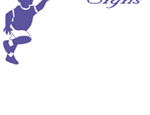|
For Immediate Release
Contact: Nancy D. Wiseman,
First Signs, Inc.
(978)346-4380
nwiseman@firstsigns.org
National Model Statewide Campaign to Educate Parents, Physicians About Early
Warning Signs of Autism Will be Launched in Minnesota
MINNEAPOLIS--An innovative statewide campaign designed to educate physicians
and parents of young children about the early warning signs of autism and other
developmental disorders is underway in Minnesota.
The program -- Minnesota First Signs
-- is providing free training, screening
kits, and CME credits for physicians, nurse practitioners, and physician assistants
in a statewide program that organizers believe can serve as a national model.
“We neither know how to prevent autism nor how to cure it, but we do know
that early detection and intensive treatment can profoundly change the quality
of
life for children at risk and their families,” said Nancy Wiseman, president
of First Signs
.
Back to top
The campaign is a collaborative effort of the Minnesota Department of Education,
Autism Society of Minnesota, University of Minnesota, Minnesota Department of
Health, and First Signs, Inc., a nonprofit organization that is spearheading
the effort.
The goals of the initiative, which begins in May, are to:
- Increase knowledge and
awareness of the early warning signs of autism and
other developmental disorders.
- Improve frequency and quality of screening of
young children from birth through
the early school years.
- Facilitate timely referral of children to local early
intervention programs.
- Lower the age when children with autism and other development
disabilities
are identified.
Autism is now the third most common childhood disorder in the country, behind
mental retardation and language impairment.
Back to top
The prevalence rates of Autism Spectrum Disorders (ASD) have risen substantially
in Minnesota as well as throughout the country in the past decade and show no
signs of leveling off, Wiseman noted.
She said that the current research indicates that autism affects anywhere from
1 in 200 to 1 in 500 children in Minnesota. Based on those figures, she estimated
that between 2,754 and 6,434 children have ASD.
“Screening can be simple, taking no more than five minutes. Through observation,
screening, and sharing with parents, you can ensure each child’s healthy development.
The key is early detection,” Wiseman said.
While each child develops at a different rate, some differences may indicate
a slight delay and others, such as no gesturing by nine months or no words by
16 months, may be cause for greater concern and alert parents and physicians
to the need for an immediate evaluation,” she added.
Neuroplasticity can be influenced by early intervention and provide children
with a greater chance of getting back on the right developmental path.
Recent policy statements from the American Academy of Pediatrics (AAP) and American
Academy of Neurology (AAN) recommend routine developmental screening and surveillance
at every well visit from birth through school age to identify those at risk for
atypical development.
Additional information for parents and physicians regarding autism and related
developmental disorders can be found at www.firstsigns.org.
####
Back to top
Read the fact sheet about the Minnesota First Signs
program.
####
Minnesota First Signs Screening Kit now available
The First Signs Screening Kit has now been tailored specifically for use in Minnesota
and is available for immediate distribution.
The Minnesota First Signs Screening Kit includes all the items in the original
First Signs Screening Kit including the video and screening tools, as well as
specific resources and referral information for every community in the state.
For order information in Minnesota,
click here.
Back to top
| 



